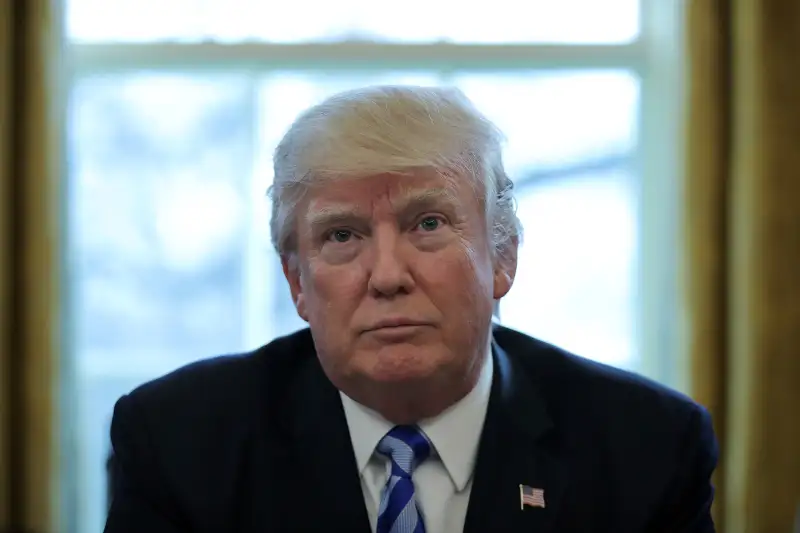The Trump Administration Still Has a 'Nuclear Option' for Killing Obamacare

President Donald Trump says Obamacare will collapse under its own weight in the wake of last Friday’s failure of the House Republicans' health care bill to repeal and replace the law formally known as the Affordable Care Act. But his administration also has the power to force a disaster of its own making.
The system's problems aren't fatal, experts say. While consumers in certain pockets of the country have very limited choices of insurers on the public exchanges, the nonpartisan Congressional Budget Office wrote recently that the individual markets would probably remain stable in most areas under the current law.
On the other hand, active or passive efforts to weaken Obamacare could cause the failure of the individual marketplaces and jeopardize the health care of the more than 12 million Americans covered on them. The law gives the executive branch wide latitude to make certain changes. "There's a great deal of opportunity to undermine the Affordable Care Act from within," says Linda J. Blumberg, senior fellow in the Health Policy Center at the Urban Institute.
One of the most lethal strategies at the administration’s disposal is to stop paying the cost-sharing subsidies that reduce out-of-pocket costs for lower-income consumers--those making up to 250% of the federal poverty line, or about $30,000 for an individual. “In health insurance terms, this is the nuclear option,” says Sabrina Corlette, research professor at Georgetown University’s Center on Health Insurance Reforms.
The Trump administration has not yet decided how to proceed on this issue, according to a spokesperson. There are several ways this could play out: the administration could actively stop the payments, express some sort of support for them, or remain silent on the issue. Here's what each might look like.
The Nuclear Option
In 2016, the federal government paid an estimated $7 billion in cost-sharing payments to insurers on behalf of more than 6.4 million marketplace consumers, according to the Kaiser Family Foundation. These payments, which were paid by the government directly to insurers, lowered the deductibles, out-of-pocket spending caps and other costs for these consumers, making insurance affordable for them.
The fate of these payments is currently tied up in a lawsuit that the House of Representatives brought against the Obama administration in 2014. Lawmakers argued that the government had wrongly spent billions of dollars in subsidies without the proper Congressional appropriation, and a trial court judge agreed. The Obama administration appealed the decision, which is now on hold at the U.S. Court of Appeals for the District of Columbia Circuit.
(The defendant in the original suit was Sylvia Burwell, then-secretary of the U.S. Department of Health and Human Services. In an ironic twist, the lawsuit has been re-named House of Representatives v. Thomas E. Price after the current head of the department, who was a Republican member of the House of Representatives when the suit was first brought in 2014.)
Insurers would incur big losses almost immediately if the cost-sharing payments were to stop, experts say. That could happen if the Trump administration decides to drop the appeal and directs the Treasury Department to stop making cost-sharing payments. In that scenario, “carriers would leave the markets as soon as legally feasible,” Corlette says. While the exact legalities might vary by state, a cessation of payments would likely allow carriers to exit their 2017 contracts partway through this year, Corlette says.
Faced with an imminent exodus of carriers from the individual market, lawmakers and administration officials would have an incentive to come back to the negotiating table and hammer out a workable alternative to Obamacare, says Michael Cannon, director of health policy studies at the libertarian Cato Institute and a critic of Obamacare. Indeed, on Monday night Trump tweeted, "The Democrats will make a deal with me on healthcare as soon as Obamacare folds--not long."
Cannon agrees with the trial court opinion that the cost-sharing subsidies are unconstitutional and says Trump would be honoring his oath of office if he rejects them.
The Supportive Approach
Administration officials may shy away from such brinkmanship knowing they would likely bear the blame for the tumult it causes, says James Capretta, resident fellow at the conservative American Enterprise Institute.
In that case, another scenario would be for the administration to commit to continuing the appeal, essentially arguing the Obama administration’s position in court. This would send the message to insurers that the Trump administration supports the subsidies, even though the case would still have to wind its way through the courts.
Alternatively, Trump could seek to gain the Congressional appropriation for the cost-sharing payments that eluded the Obama administration, Capretta says. The president might actually make some headway there, Capretta notes. After all, many lawmakers got an earful of constituents’ concerns about losing coverage at town hall meetings this winter, and they might not want to be seen as hindering the system.
Staying Silent
Perhaps the most likely scenario is that the Trump administration does nothing for now. That is, officials neither publicly commit to the payments nor seek to stop them. Yet this passive approach could ultimately prove as damaging to the health of the individual insurance markets as a more active attempt to undo them, says Deep Banerjee, director at S&P Global.
Insurers are currently deciding whether to participate on the public exchanges for next year. The looming uncertainty over the fate of the cost-sharing payments could cause them to drop out for 2018 to avoid a scenario where they get caught short. “They would prefer to have clarity on this ASAP,” Banerjee says.